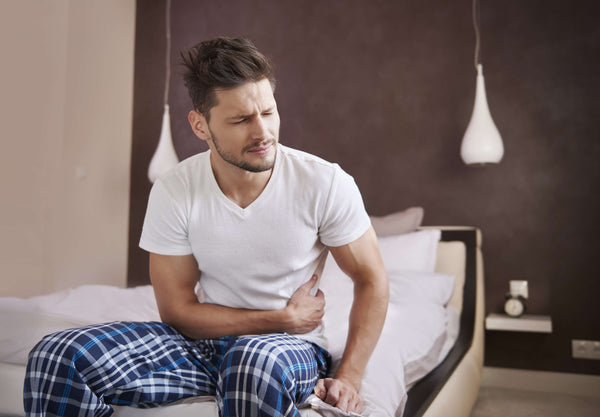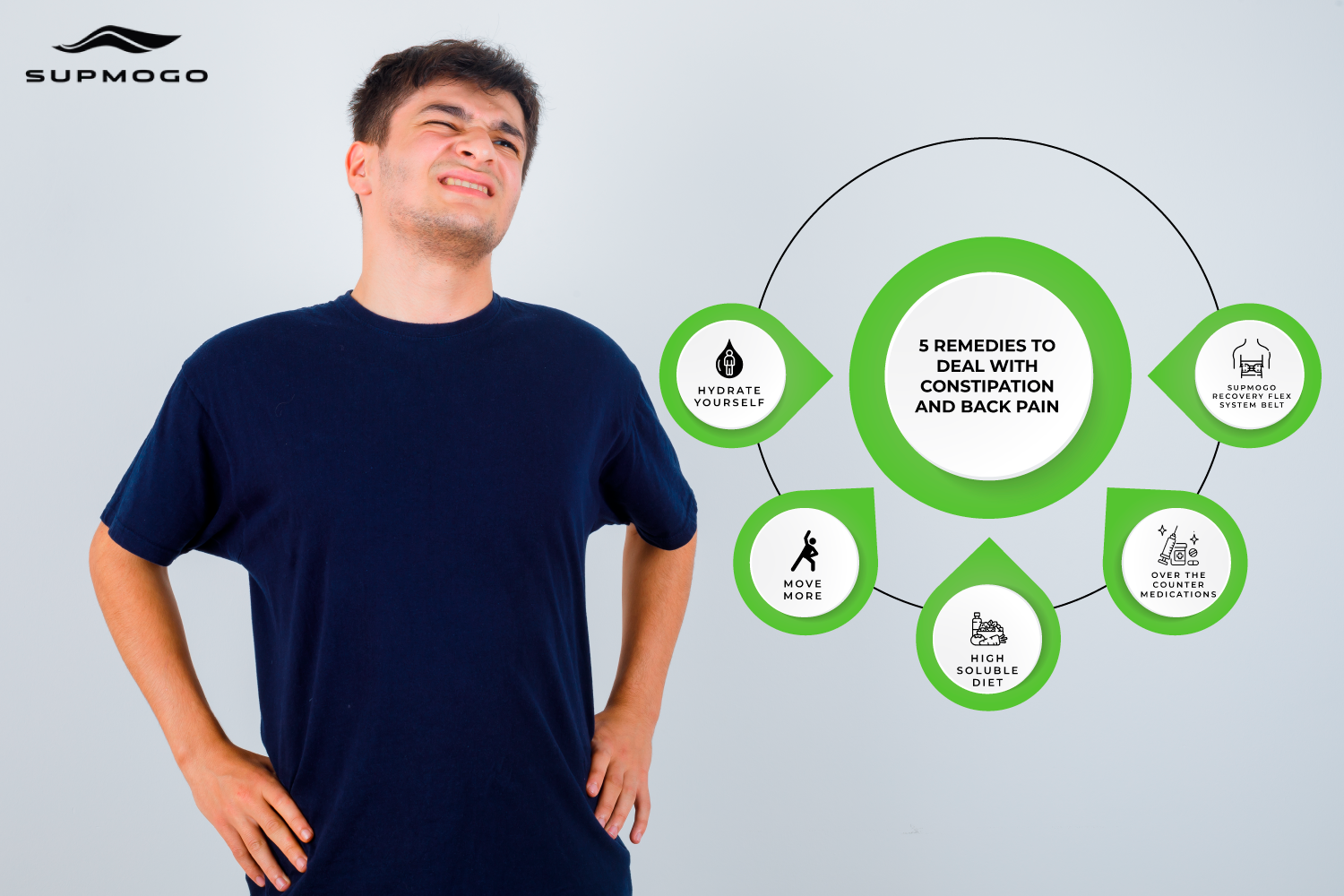Constipation is among the most awful situations one can face in his life. It is the irregularity of bowel movement or difficulty in passing stools.
However, the lingering and unpleasant back pain makes this awful situation even worse. The constant urge to dissect your bowel and put out all the stool so your back pain can settle down is exhausting!
Most of the young generation faces this undesirable constipation with back pain mainly because of an inappropriate diet and an unhealthy lifestyle. But don’t feel down just yet; we’re here with all the information and answers you need about whether constipation causes back pain. If yes, then what are the wondrous treatments? Here’s what we’ll learn in this article.
- Understanding Constipation
- Problems Associated With Untreated Constipation
- Radiating Abdominal Pain
- Spinal Compression and Backache
- 3 Major Factors Contributing To Constipation and Back Pain
- Fiber Intake
- Dehydration
- Lack Of Exercise
- 5 Remedies to Deal with Constipation and Back Pain
- Hydrates Yourself
- Move More
- High-Soluble Diet
- Over-The-Counter Medications
- SUPMOGO Recovery Flex System Belt
Understanding Constipation
The cramps and tightness you feel after eating high-fat meals are holding down constipation. It is an infrequent bowel movement–you feel constipated when bowel movements become tough because of hard and dry stool.
According to research, 20% of the general population faces constipation. However, the severity and duration vary from one age to another and from one gender to another. [1]
It may be mild constipation which lasts for two to three days, and you get to recover with some counter medications, or it may persist for a long time–developing into chronic constipation.
Problems Associated With Untreated Constipation
Constipation is a little devil that impacts many things. Let’s briefly look at some of the health concerns associated with constipation.
1. Radiating Abdominal Pain

The pain of stagnant hardened stool radiates throughout the body, causing discomfort in the back of the body. It may also feel like period pain or period cramping. Research also demonstrates that abdominal pain is directly associated with constipation. [2]
2. Spinal Compression and Backache
We all are familiar with the feeling that constipation causes back pain. However, the how remains unclear. Let’s see how constipation is linked to back pain.
What happens when you overload the air pressure in tires? It bursts, right? The same goes for constipation and back pain.
When your bowel and digestive tract are filled with hard fecal matter and bowel gases, it gets blocked and compresses your muscles and nerves. Moreover, it puts lots of pressure on the spine. That pressure can impact your back and make you feel discomfort and even feelings of severe back pain.
3 Major Factors Contributing To Constipation and Back Pain
There are several factors that lead to irregular bowel movements. Some causes are related to lifestyle, while some are to diet. Let’s have a look at all the primary causes of constipation.
1. Fiber Intake
Fiber can make or break your bowel movement. The soluble fiber can increase your stool movement and aid constipation. However, according to research, insoluble fiber foods can worsen constipated health and related abdominal and back pain. Instead, they work wonders for patients with diarrhea. Therefore, it is important to know which type of fiber your body needs, based on your health condition. [3]
2. Dehydration
Back pain from constipation is often caused by dehydration. It may sound old school, but water is mandatory for keeping your body in good health. Lack of water consumption/dehydration can lead to mild to chronic constipation.
3. Lack of Exercise
Have you noticed that taking a walk helps you relieve constipation pain or eases constipation? According to Harvard Health, your colon and bowel respond directly to exercise. When your muscles are inflexible, the stuck stool causes extra tension and tightness, leading to back and abdominal pain.
Read about Upper Back Pain Causes & What to Do About It.
5 Remedies to Deal with Constipation and Back Pain

Following are some remedies to treat back pain and constipation. Some of these antidotes date back thousands of years. Let’s dive in!
1. Hydrate Yourself
Hydration is the key to everything! From skin, regulated blood sugar levels, balanced blood pressure, healthy organs, and so much more! It will cure the dehydrated body cells and soften stool to pass. You can also add hydration-filled food to your diet as watermelon, cucumber, etc.
Water consumption significantly reduces the chances of constipation and even cures it to some extent. According to research, it is important to maintain hydration to prevent constipation. [4]
2. Move More
Get yourself out and move more than you normally do. When you perform adequate exercise, jogging, running, or even walking, it can help your stool pass smoothly through muscle contraction and increase gut mobility.
Moreover, stretching and exercising can assist you in relieving back pain caused by constipation.
3. High-Soluble Fiber Diet
Let’s admit the truth! Changing your diet and lifestyle can make a big difference. A diet incorporating high-soluble fiber foods can be your one-way solution to relieve constipation. A high-soluble fiber diet can help soften stool and regulate normal bowel movements.
Add more whole grains, wheat, oats, quinoa, peas, beans, apples, oranges, carrots, seeds, and nuts to your life to relieve constipation.
4. Over-The-Counter Medications
These medications are known as laxatives and are preferably used after consultation with a physician.
- Psyllium (1 brand name: Metamucil)
- Polycarbophil (1 brand name: FiberCon)
- Methylcellulose (1 brand name: Citrucel)
5. SUPMOGO Recovery Flex System Belt
SUPMOGO offers a superb product that relieves back pain and constipation.
The SUPMOGO Recovery Flex System Belt can assist you in the journey of easing the intense and uncomfortable pain of constipation.
It uses innovative EMS technology, also renowned as Electrical Muscle Stimulation, that stimulates your muscle fibers and increases the speed of contraction while generating heat naturally. These contractions, combined with a heating effect, help to facilitate the gut to speed up bowel movements. Its Advanced Targeting Technology helps to target the root cause of back pain by taking the minerals from water and feeding it to your muscles.
If you want to know more about our unique SUPMOGO Recovery Flex System Belt, follow us on Instagram or Twitter to get the daily highlights!
Summary!
Constipation is something that attacks you at least once every few months. However, the uncomfortable back pain that persists throughout the constipation journey is nothing less than misery. Many people are still looking for answers does constipation cause back pain?
The answer is yes; back pain and constipation are linked. There are conventional ways to treat back pain caused by constipation, such as increasing water intake or consuming soluble fiber, painkillers, and muscle relaxants. However, these treatments sometimes cause more constipation in the patients. In such troublesome times, a muscle stimulator such as SUPMOGO Recovery Flex System Belt is a comprehensive approach to treating back pain with constipation.
----------------------------------------------------------------------------------------------------------
[1] Roque, M. V., & Bouras, E. P. (2015). Epidemiology and management of chronic constipation in elderly patients. Clinical interventions in aging, 10, 919.
[2] Wong, M. Y., Hebbard, G., Gibson, P. R., & Burgell, R. E. (2020). Chronic constipation and abdominal pain: Independent or closely interrelated symptoms?. Journal of Gastroenterology and Hepatology, 35(8), 1294-1301.
[3] Ho, K. S., Tan, C. Y. M., Daud, M. A. M., & Seow-Choen, F. (2012). Stopping or reducing dietary fiber intake reduces constipation and its associated symptoms. World Journal of Gastroenterology: WJG, 18(33), 4593.
[4] Arnaud, M. J. (2003). Mild dehydration: a risk factor of constipation?. European journal of clinical nutrition, 57(2), S88-S95.

0 comments